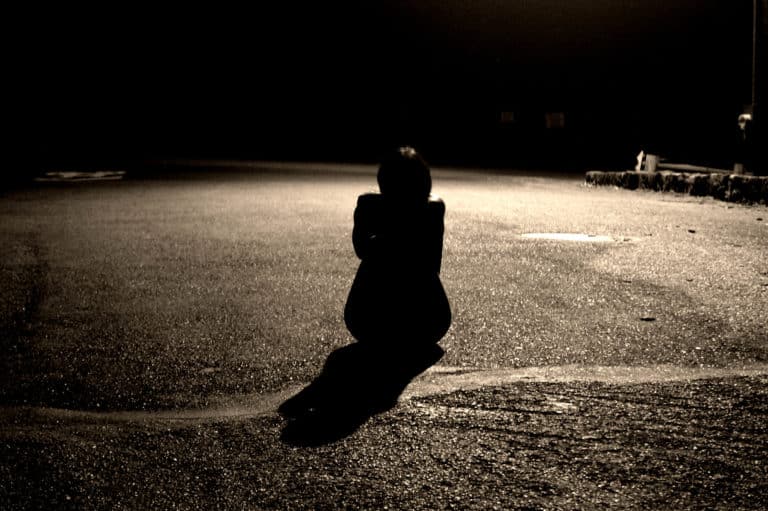
Image by Maga Soto.
My Scars Are My Memories: Why I Stayed and Why I Left
Author’s Note: I wrote this after listening to a marathon of On Being episodes, specifically the wonderful interviews with Mary Oliver, Helen Fisher, and the unstoppable Brené Brown. Being open, brave, and vulnerable means telling one’s story of intimate partner violence. I’m an attorney now, and I volunteer 15 hours a month at a local domestic violence clinic, but I rarely tell my clients my story. I think maybe it’s time to share.
The first time she hit me it seemed stupid. We weren’t angry. We were laying with our heads on opposites sides of my college extra-long twin bed. We were laughing, playing really, when I put my bare foot on her face. Like a flash she sat up and slapped my face — hard.
Of course, that was an isolated incident, right? An instinct gone wrong, a muscle spasm of sorts, combined with a germ phobia and my habit of walking around everywhere without shoes or socks.
And it was written off.
Then, when we argued, she started grabbing me, holding me in place, sinking her nails in the back of my arm like an army of angry ants. Then it was hair-pulling. Then the incident with the hairbrush — she hit me with it, anything to get me to shut up. God knows I can run my mouth like a marathon and I bite with my words like she bit with her teeth — hard.
Each incident would pass, like flash floods, sudden and devastating, over quickly. And she would return, funny and charming and always so hopelessly apologetic — it was always about changing and the last time and this time was this or that. And it was all excuses and tears, and I would hold her and rock her and kiss her forehead as she tried to figure out why, why, why and she would always beg me not to leave and I didn’t, and sometimes she begged me to leave and I didn’t.
She hated it, hated herself, and so did I. One time, she left bruises on me, head to toe (but not the face, that would come later) and she stripped me naked, so gently, and she took pictures of my broken down body and swore to look at it every day until she never did it again.
It happened again. Again. Again.
They ask, “Why did you stay?” and I say I stayed because I believed. I believed in us and our promises and our naïve love that should and could have lasted forever if we were a bit older and wiser and kinder to each other. If we didn’t both come from families that spoke violence, different dialects but present like ugly underneath. If we had gotten that counseling that the dorm head said we had to get, but never did. If we had stopped smoking weed or drinking or doing anything we could to get out of us. Maybe there were chances, but we were too young and dumb to fix anything.
And it got worse. Pro tip: It always gets worse. The isolation, control, and all 31 flavors of clichéd behavior covered us like a rule book that kept everything just the right amount of survivable impossible. It normalized. The fact that she would punch me, closed fist, on the head, over and over and over and over ’til stars sparkled in my periphery — it just seemed like one more thing we were working on.
So we got married. Or became domestic partners, because we were so young that gay marriage wasn’t even legal yet.
Then I got sick, very sick, the kind of sick you can’t walk away from — or she could but didn’t, and I couldn’t, because I had a cane and couldn’t talk and she rubbed my back and bathed me and made sure I took my medications on time and made me laugh when I thought I was dying. From the hospital, she called and introduced herself to my estranged parents and eased the way to making my family whole again.

So we stayed, and I got better, slowly, and we were together. For a while, there was a rule: you can’t hit the sick one, she has a cane, that’s not fair. And we thought it was behind us.
It wasn’t.
That ring on her finger (, bought on Telegraph Ave, we wore matching circles) became another weapon. It was an accident, when she backhanded me taking off the bottom of my top tooth. Same with the top of my bottom tooth, straight perfect teeth paid for in teen angst and awkward kisses, only to be cracked off in an argument about cleaning or flirting or exes or kitty litter — who can remember now, I’m sure it was so important at the time.
A few years later, we had cats and a lease and shared our money and our accounts and families. We had furniture and art and were still madly in love — even though I’m sure the neighbors paused at their San Francisco walk up, wondering if today was the day they should call the cops or call us, or if maybe it was just the TV, you don’t want to get involved, after all, you, neighbor friend, smoked bowls with us, and we were just lovely and funny, and fit together like love is supposed to, right?
They never did.
It ended, eventually. She kissed some girl who looked a little bit too much like her reflection, and I was sad, and too sad, apparently, because the next day she beat me up, all over, and hit my head against the wall and punched me over and over until the room was silent.
I told her I was leaving.
Even that wasn’t the end. We still lived together. I told her I needed time, and she needed help, therapy. She got counseling right away but far too late. A girl at work started paying attention to me, and I latched on, grabbing on like a life preserver, floating away while the woman I really always and forever loved faded to black and white.
She begged me, really begged me to come home, to stay, but she did it with a knife, my kitchen knife I still use to chop tomatoes, and she held it to her arm, where she had our tattoo inked into her skin and she started cutting, trying to excise us from under her skin, where we lived and lied. She stabbed our coffee table. Banged her head against the wall ’til it bled.
I called the cops.
I tried to go outside, but she grabbed me — hysterical, screaming, hitting me while I crawled along the floor of our kitchen, her holding me down, desperate to get outside and away, not sure if this was it, whether I would be back with her the next day, unsure of what would happen when the cops came.
They came. Their eyes darted back and forth between us, shining the flashlight between the two of us. “Who called the cops?” they asked, unsure of what to do with two young women. She didn’t have shoes on. They arrested her, or at least handcuffed her, but I lied, I told them she hadn’t touched me, that she was going to kill herself, that she needed help. They took her away.
I was gone when she came back.

The next part was hell, and I’d be a damn liar if I didn’t say I missed her every single moment of every single day for weeks, months, years. She met some girl who I hated, and she hated that I stayed with the girl from work, but it was all lies, lies, lies. We met up a few times over the next year, and every time, we stole back our love in hugs and kisses and sex and shared cigarettes and we lied and lied and lied to everyone we loved.
It took over a year to get divorced, and the first attempt failed because we had sex instead. I moved back in with her. She came to me, drunk, in the middle of the night, reeking of vomit and men’s cologne. She’d gone and slept with some older guy, but now she only wanted me, right. Right? Forever and always, she slurred.
When we finally got divorced, I cried the whole way through and she held my hand. She went home to that girl I (still) hate and I went home, saving the bus ticket like it was the last proof of our reality.
It’s been almost five years since we broke up and my teeth are still chipped, my relationships are still volatile like I learned little, and I still struggle to believe that this all happened in my one and only life. Maybe I should have regrets, but I don’t. We don’t talk anymore — I heard she married that girl, that she finally passed the California Bar, that she still lives in San Francisco with the cats that are mine, too.
That kind of love. That messy ugly, undignified and painful, embarrassing and power imbalanced, frustrating, deep deep love — I don’t think I’ll have it again — no, not like that. And that’s good, I think. But I stayed and I left and my scars are my memories and my promises and I don’t know if I’ll ever think right, think and feel in a healthy way like I’m supposed to — and what to do with that is an unknown quantity. Maybe I’m now an unknown quantity or quality, and maybe I’ll figure it out and maybe I’ll be okay — maybe.
If you or someone you know is in crisis and needs help, the National Domestic Violence Hotline is 1−800−799−7233.


Share your reflection